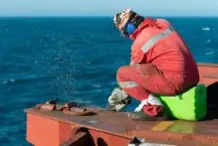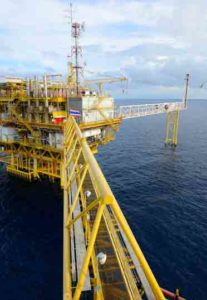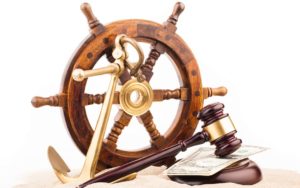
Accidents at any workplace can be frightening experiences, especially if employees are injured in the process. However, off-shore accidents can be especially harrowing, as they are often much more severe, and injuries can be life-threatening to the maritime workers involved. Complicating matters further is the fact that ordinary worker’s compensation does not apply to maritime workers, who must pursue compensation through injury claims and lawsuits.
If you are a maritime worker and have been injured in an off-shore accident, our lawyers can help. We have off-shore accident attorneys who serve the Fort Polk area and can handle every phase of your injury claim or lawsuit.
Common Types of Off-Shore Accidents
A lot can go wrong when you’re working on the water. Anything from storm systems to a lack of safety protocols to a coworker’s carelessness could result in an off-shore accident. Some of the more common off-shore accidents can include:
- Falling Objects: Heavy objects or equipment can fall from great heights onto workers below.
- Derrick Collapses: In many cases, workers may be severely injured when derricks collapse or fail.
- Crane Accidents: Crane accidents can cause severe injuries and fatalities due to falling equipment or failures in crane mechanisms.
- Slip and Falls: Oil rigs and seafaring vessels pose many hazards, including slippery surfaces that lead to falls.
- Explosions: Fires and explosions aboard oil rigs can cause devastating injuries or fatalities.
Laborde Earles injury was great for me they took care of me very fast and professional. If for any reason I need legal help they will be who I use.
ClientWhat Should I Do After an Off-Shore Accident?
Though the moments and days following an off-shore accident can seem to by in a blur, there are steps you should take that can impact both your health and your injury claim, including:
- Seek medical attention. After an off-shore accident, see a doctor as soon as possible. Even if your injury appears minor, it’s important to see a doctor for an evaluation. If you’ve suffered a serious injury, you should be taken off the rig or vessel and transported to the nearest hospital immediately.
- Report the accident to your employer. You must notify your employer about your accident as soon as you can. In some instances, you only have seven days to do this or you lose your right to pursue compensation.
- Don’t go back to work before you’re ready.It’s important for people who work off-shore to understand that if they return to work too soon after an injury, they may aggravate their injuries. If a company tries to pressure an employee into going back to work after being injured, this too can be evidence of negligence.
- Follow your doctor’s advice. Follow all of your doctor’s advice after an off-shore accident. While you may want nothing more than to return to work right away, pushing yourself too hard can result in more severe injuries that prevent you from ever working again.
- Keep track of your medical documents and expenses. You should keep copies of all medical bills, documents, and expenses related to your accident. These could be invaluable pieces of evidence when your lawyer negotiates your settlement.
- Don’t talk about the case without your lawyer. Do not post about your accident on social media. Do not chat about it with coworkers or supervisors, and don’t sign any agreements without your attorney present.
I thank God for Digger & David. I don’t know what we would have done if it hadn’t have been for them.
Rick Smith | ClientCompensation You Can Pursue In Off-shore Accident Claim
You and your off-shore accident lawyer can seek compensation for several different things after an off-shore accident. It depends on how severely you were injured and how your injury has generally impacted your life. The most common types of compensation include:
Medical Costs
You can recover the cost of medical expenses or treatment related to your injury. This can include ambulance expenses, emergency room visits, hospitalization, doctor appointments, physical therapy, prescription medication, and rehabilitation costs.
Lost Wages
If you have to take time off work to recover, you can seek compensation for your lost wages and future losses in earning capacity.
Pain and Suffering
You can seek monetary compensation for pain and suffering resulting from an accident injury. This includes the physical pain caused by your injury and emotional distress, such as anxiety or depression caused by an accident.
Loss of Enjoyment
Injuries from accidents can prevent you from doing things you enjoy in life, such as going on vacation, playing with children or grandchildren, or playing sports. In this type of claim, you can seek compensation for loss of enjoyment of life.
Wrongful Death
If a loved one died in an off-shore accident while working, you may be entitled to their lost wages, loss of companionship, or even funeral expenses. A lawyer from our firm can gently guide you through the legal process during this difficult time.
The reassurance from Digger and his staff gave me that renewed hope that it’s going to be okay down the road.
ClientThe Jones Act
Injured seamen have the right to sue for compensation and can hold any negligent parties accountable under the Jones Act. To qualify, you must be a seaman who works on a navigating vessel and spend at least 30 percent of your time onboard.
Your lawsuit must be filed within three years and you must inform your employer of the injury within just seven days. An off-shore accident lawyer serving the Fort Polk area can tell you if you qualify, answer your questions, and determine the right legal route to take.
They treated us like no other people would. Whenever we needed something they were there for us. I put my trust in them and I don’t regret it.
ClientThe Longshore and Harbor Workers’ Compensation Act
The Longshore and Harbor Workers’ Compensation Act (LHWCA) provides coverage to maritime and off-shore workers not covered under the Jones Act. The LHWCA specifically covers employees who work on or adjacent to navigable waters, such as piers, wharves, and docks. Under the LHWCA, you have up to one year to file your injury claim and the accident must be reported to your employer within 30 days.
Contact Laborde Earles Injury Lawyers for Legal Counsel Today
Whether you’ve lost a loved one in an off-shore accident and are unsure how to proceed, or have been injured and are looking for legal counsel and advice, our attorneys at Laborde Earles Injury Lawyers are here to help. We know this area of law and can guide you through your legal options. Contact us today to schedule an appointment for a free case review.




